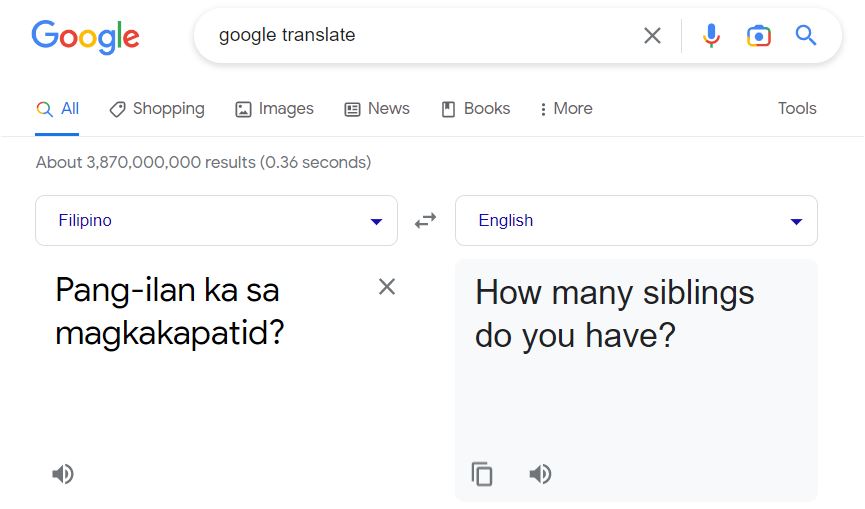Creativity is one of the positive traits of Filipinos. They possess various skills and talents, including proficiency in languages. In fact, basically all Filipinos are bilingual or multilingual, with many being able to speak in Filipino, English, and a native language, such as Cebuano, Ilocano, Hiligaynon, and many more.
Additionally, most Filipinos are able to “code switch” (i.e. switch between different languages) with ease. This is made evident by the dominant use of “Taglish” (Tagalog + English) in schools, in the workplace, and even at home. In this article, we will discuss a language-related topic: translation. In particular, we will focus on translating a seemingly simple phrase: “Pang-ilan ka sa magkakapatid?”
“Pang-ilan Ka sa Magkakapatid?” English Translation
Filipino and English are both official languages of the Philippines. So it should be easy to translate from language to the other, right? Well, not exactly. To translate the question, “Pang-ilan ka sa magkakapatid?” — we scoured the web for answers.
We found a lot of answers. Are you ready for them? Let’s go!
Google Translation
Let’s start with the most convenient method of translation. Google is supposed to know everything, right? And besides, there’s Google Translate. So, we simply enter the question, and voila! The answer is:

According to Google Translate, “Pang-ilan ka sa magkakapatid?” translates to “How many siblings do you have?” in English. But wait, that’s not correct!
“How many siblings do you have?” would be “Ilan kayong magkakapatid?” or, to be more precise, “Ilang kapatid ang mayroon ka?” in Filipino. That’s not the answer we are going for. In this case, Google Translate is wrong and inaccurate!
Direct Translations
Many well-meaning Filipinos tried to translate the question directly, word for word. Here are some “serious” answers that we found in various forums and social media:
Pang-ilan ka sa magkakapatid?
- What is your place in the sibling order?
- What is your birth order among your siblings?
- What’s your ordinal rank among your siblings?
- In what order were you born among your siblings?
- What ordinal value was your birth among your siblings?
- Among you and your siblings, which is your birth order?
- In what chronological order do you fall among your siblings?
Notice that all of these translations are almost the same, albeit with slight differences in the terms used: birth order, chronological order, ordinal rank, etc.
In terms of grammar, the above translations are correct. Verbally speaking, however, they don’t sound “natural” at all. To be honest, they sound weird and awkward. If you tried using any of these with your English-speaking friends, they would be confused!
Here is another sample translation using the same terms as above:
Pang-ilan si Ferdinand Marcos, Jr. Sa mga Pangulo ng Pilipinas?
- What is the ordinal number of Ferdinand Marcos, Jr. among the Presidents of the Philippines?
- In what chronological order does Ferdinand Marcos, Jr. fall as President of the Philippines?
Sounds weird, right? Not exactly the answer we are looking for, either.
Funny Translations
Here’s what many Filipinos are totally good at: funny translations. Upon looking at some forums and social media posts, here is what some people had to say:
Pang-ilan ka sa magkakapatid?
- What is your birth position?!
- If your siblings are three, where are you? First, second, or third?!
- In what honorable mention are you in the ranking of your siblings?!!
- If you are the Xth child among your siblings, what is the value of X?!!
Still not exactly the answers we are looking for, but you’ve got to give these translations credit for being downright funny. Hehehe.
Rephrasing the Question
If Google Translate is wrong, and attempts at direct translations are inaccurate… what, then, is the correct answer? How can we translate: “Pang-ilan ka sa magkakapatid” into English?
Here’s what some Filipino teachers and linguists have to say: there is no direct, exact translation of this question. This is because the term “pang-ilan” does not have an equivalent word in English.
In order to translate the question properly, it needs to be rephrased. A possible solution would be to ask more than question, as follows:
Friend 1: Do you have any siblings?
Friend 2: Yeah.
Friend 1: How many are you?
Friend 2: There’s three of us. I have one brother and one sister.
Friend 1: Are you the eldest or youngest?
Friend 2: I’m the middle child.
So there you go. Since there is no direct translation of the said question in English, you would have to ask two or more questions, in order to get the answer. This may be a roundabout way of doing things, but it is what it is. Hehe.
Video: Celebrities Translate “Pang-ilan Ka sa Magkakapatid?”
And now, let’s see how famous Filipino celebrities tried to translate this question. Check out this video shared by Dwaine Woolley, an Australian who knows how to speak three Filipino languages — Tagalog, Bisaya, and Waray. Amazing, right?
In the following video, Dwaine asked popular stars Piolo Pascual, Alessandra de Rossi, Empoy, and Moi Bien to translate the question. Let’s see how they answered!
Video: Filipinos Take on Translation Challenge
Meanwhile, here’s another video, posted on the YouTube channel of HumanMeter. HumanMeter describes itself as a “progressive Philippine community” that engages strangers on the streets, asking questions about different topics.
Let’s take a look at how Pinoys “on the street” faced HumanMeter’s translation challenge:
Video: Tagalog to English Translation
And last, but certainly not the least — here’s an audiovisual presentation that features various English translations of the question, “Pang-ilan ka sa magkakapatid?” The video is posted by “Anatomy of English,” a YouTube channel that aims to help viewers improve their English language skills:
How do you say “Pang-ilan ka sa magkakapatid” in English? This is probably a question that will continue to be discussed by Filipinos and foreigners alike — inside as well as outside the classroom!
Ultimately, the important thing is that we recognize that each language is unique, and that certain words have no equivalent translation. In this case, we need to be aware of context (which Google Translate doesn’t have), so that we can think of ways to rephrase and conduct our conversations, especially when communicating with people who speak a different language (or languages).
READ NEXT: 60 Best Filipino (Tagalog) Pick-up Lines
